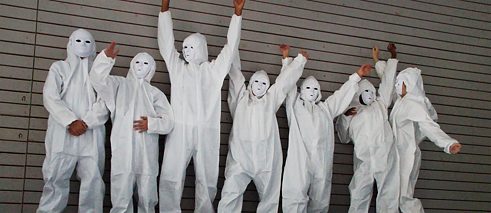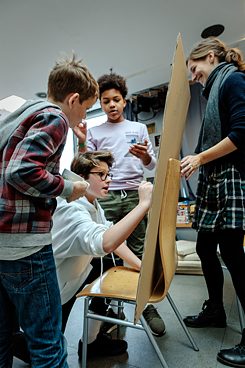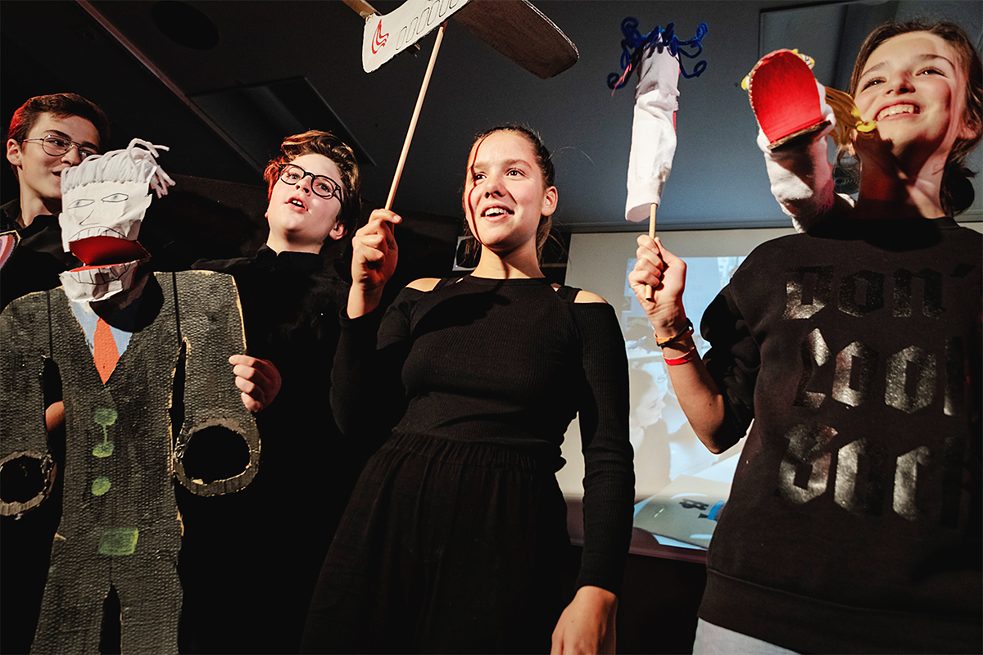Cultural education
“We do not dispense school knowledge”

“Politik im Freien Theater” is a free theatre festival where youngsters address political issues. What can theatre do that school cannot? “It prompts discussion and creates access,” says drama teacher Anne Paffenholz.
Organised by Germany’s Federal Agency for Civic Education (bpb), the “Politik im Freien Theater” festival has been going for 30 years. The 10th edition was staged in 2018 in Munich, where more than 800 children and young people came together to focus on political topics. The following is an interview with bpb consultant and theatre educator Anne Paffenholz.
Ms Paffenholz, you directed the Youth and School programme of the “Politik im Freien Theater” festival. This was the first time such a broad programme was featured for children and teenagers. What made you extend the range of activities?
The preceding festival in Freiburg in 2014 showed there was high demand for events for teachers and students. This time, in cooperation with lots of partner organisations and artists, we linked up political and cultural education. The theme of the festival was “wealth” – and we broke down the subject into its constituent parts and then reconstructed it in holiday workshops and school projects.
What forms did that take?
Films were made, a stage play was developed with human actors and puppets, upcycling stories were told in showcases and song lyrics were written, performed and recorded – all under the guidance of artists. There was also a programme of guided tours, where youngsters visited self-help centres, food banks or soup kitchens.
What can theatre do for political education that cannot be done in school?
In theatre, topics are not addressed in a purely rational manner. Theatre is a more physical, more emotional medium. It prompts discussion and creates access, especially for young people. We made it clear to the kids that we were not going to dispense school knowledge and test them on it afterwards; we expected no standard school answers. We wanted them to form their own opinion and acknowledge the opinions of others. That went down well, we had lots of positive feedback.
 The “Millionaires of Tomorrow” workshop jointly run by bpb consultant Anne Paffenholz.
| Photo: © Gianmarco Bresadola
Could you give an example of your own festival work?
The “Millionaires of Tomorrow” workshop jointly run by bpb consultant Anne Paffenholz.
| Photo: © Gianmarco Bresadola
Could you give an example of your own festival work?
Together with a colleague, I ran a workshop on the subject “Millionaires of Tomorrow”, where students took a close look at what it means to be rich and produced a kind of live tutorial with text collages, music, puppet and object theatre. One girl said: “I don’t want to be rich. Rich people are not nice.” Comments like that can be a starting point, an introduction to longer conversations that cast light on the subject.
You mentioned feedback earlier. What sort of comments did you receive?
One teacher reported that we had really managed to reach his students with our approach. He told us we had prompted discussions that would not otherwise have taken place. And from the children we heard things like: “Learning is fun in a place like this.”
The festival programme included a youth workshop on “Transcultural Education in Times of Cultural Globalisation”, which you staged in cooperation with the Goethe-Institut. The idea was to discuss “cultural institutions of the future”. But does an abstract concept like “transculturality” really mean anything to teenagers?
It is certainly not instantly understood. But it is readily understood when you explain it. Youngsters need only look around them: does everyone at school have the same background, the same socialisation? How do they differ – and what different needs do they have, especially in terms of culture and theatre? For us, the main thing was that the young people should learn that there are lots of different lifestyles and biographies – and that that diversity is reflected in cultural life.
 Students in the final presentation of “Millionaires of Tomorrow”.
| Photo: © Gianmarco Bresadola
And also maybe that they should learn to value it?
Students in the final presentation of “Millionaires of Tomorrow”.
| Photo: © Gianmarco Bresadola
And also maybe that they should learn to value it?
That too. I experience transculturality in my own line of work. In arts projects and at the bpb, I work with lawyers, arts academics and musicians from various countries. That is incredibly rewarding. Transcultural work can involve clashes, of course, and is sometimes harder than if you are enclosed in your own filter bubble. But society needs the mix; it needs the exchange of views, discourse and diversity. My aim is to communicate the advantages to children and young people through theatre work – to help them gain different perspectives and to show that everyone benefits from transcultural interaction.